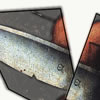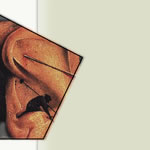
 |
 |
 |


GM's Tools; Breaking Stuff in 3.5
author: Ruemere (Ruemere)
email: ruemere (maupa) gmail (kropka) com
date: 2004-05-14
status: finished
The following d20 System Reference Documents v3.5 excerpts have been put together in an attempt to clarify rules for breaking (sundering) items.
Sundering an item
Source: CombatII.rtf.
You can use a melee attack with a slashing or bludgeoning weapon to strike a weapon or shield that your opponent is holding. If you're attempting to sunder a weapon or shield, follow the steps outlined here. (Attacking held objects other than weapons or shields is covered below.)
|
Table: Common Armor, Weapon, and Shield Hardness and Hit Points |
||
|
Weapon or Shield |
Hardness |
HP1 |
|
Light blade |
10 |
2 |
|
One-handed blade |
10 |
5 |
|
Two-handed blade |
10 |
10 |
|
Light metal-hafted weapon |
10 |
10 |
|
One-handed metal-hafted weapon |
10 |
20 |
|
Light hafted weapon |
5 |
2 |
|
One-handed hafted weapon |
5 |
5 |
|
Two-handed hafted weapon |
5 |
10 |
|
Projectile weapon |
5 |
5 |
|
Armor |
special2 |
armor bonus x5 |
|
Buckler |
10 |
5 |
|
Light wooden shield |
5 |
7 |
|
Heavy wooden shield |
5 |
15 |
|
Light steel shield |
10 |
10 |
|
Heavy steel shield |
10 |
20 |
|
Tower shield |
5 |
20 |
|
||
Step 1: Attack of Opportunity. You provoke an attack of opportunity from the target whose weapon or shield you are trying to sunder. (If you have the Improved Sunder feat, you don't incur an attack of opportunity for making the attempt.)
Step 2: Opposed Rolls. You and the defender make opposed attack rolls with your respective weapons. The wielder of a two-handed weapon on a sunder attempt gets a +4 bonus on this roll, and the wielder of a light weapon takes a -4 penalty. If the combatants are of different sizes, the larger combatant gets a bonus on the attack roll of +4 per difference in size category.
Step 3: Consequences. If you beat the defender, roll damage and deal it to the weapon or shield. See Table: Common Armor, Weapon, and Shield Hardness and Hit Points to determine how much damage you must deal to destroy the weapon or shield.
If you fail the sunder attempt, you don't deal any damage.
Sundering a Carried or Worn Object: You don't use an opposed attack roll to damage a carried or worn object. Instead, just make an attack roll against the object's AC. A carried or worn object's AC is equal to 10 + its size modifier + the Dexterity modifier of the carrying or wearing character. Attacking a carried or worn object provokes an attack of opportunity just as attacking a held object does. To attempt to snatch away an item worn by a defender rather than damage it, see Disarm. You can't sunder armor worn by another character.
Exceptions: Special Materials
(exceptions to hitpoints, hardness and sundering rules)
Source: SpecialMaterials.rtf.
Adamantine: This ultrahard metal adds to the quality of a weapon or suit of armor. Weapons fashioned from adamantine have a natural ability to bypass hardness when sundering weapons or attacking objects, ignoring hardness less than 20. Armor made from adamantine grants its wearer damage reduction of 1/- if it's light armor, 2/- if it's medium armor, and 3/- if it's heavy armor. Adamantine is so costly that weapons and armor made from it are always of masterwork quality; the masterwork cost is included in the prices given below. Thus, adamantine weapons and ammunition have a +1 enhancement bonus on attack rolls, and the armor check penalty of adamantine armor is lessened by 1 compared to ordinary armor of its type. Items without metal parts cannot be made from adamantine. An arrow could be made of adamantine, but a quarterstaff could not.
Only weapons, armor, and shields normally made of metal can be fashioned from adamantine. Weapons, armor and shields normally made of steel that are made of adamantine have one-third more hit points than normal. Adamantine has 40 hit points per inch of thickness and hardness 20.
|
Type of Adamantine Item |
Item Cost Modifier |
|
Ammunition |
+60 gp |
|
Light armor |
+5,000 gp |
|
Medium armor |
+10,000 gp |
|
Heavy armor |
+15,000 gp |
|
Weapon |
+3,000 gp |
Feat: Improved Sunder
Source: Feats.rtf.
Improved Sunder [General]
Prerequisites: Str 13, Power Attack.
Benefit: When you strike at an object held or carried by an opponent (such as a weapon or shield), you do not provoke an attack of opportunity.
You also gain a +4 bonus on any attack roll made to attack an object held or carried by another character.
Normal: Without this feat, you provoke an attack of opportunity when you strike at an object held or carried by another character.
Special: A fighter may select Improved Sunder as one of his fighter bonus feats.
Magic Weapons
Source: MagicItemsII.rtf.
Hardness and Hit Points: An attacker cannot damage a magic weapon that has an enhancement bonus unless his own weapon has at least as high an enhancement bonus as the weapon or shield struck. Each +1 of enhancement bonus also adds 1 to the weapon's or shield's hardness and hit points.
Magic Ammunition and Breakage: When a magic arrow, crossbow bolt, or sling bullet misses its target, there is a 50% chance it breaks or otherwise is rendered useless. A magic arrow, bolt, or bullet that hits is destroyed.
MAGIC ARMORS & SHIELDS
Source: MagicItemsII.rtf.
[Armors and] Shield Hardness and Hit Points: Each +1 of enhancement bonus adds 2 to a shield's hardness and +10 to its hit points.
